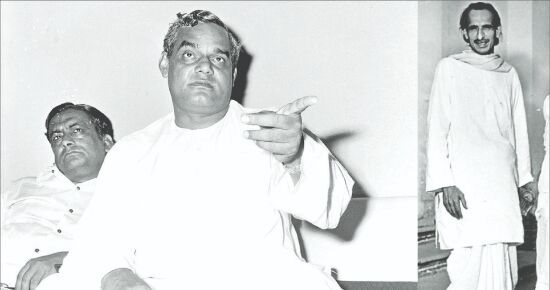Pandit Nehru’s excessive use of restraint without any semblance of action in matters of strategic responses and border disputes often came at a heavy price for the nation
In an interview to a leading news agency on June 28, 2020, Union Home Minister Amit Shah, to a question that Congress leader Rahul Gandhi had been asking regarding the Galwan issue, replied that the Modi government was not shying away from a debate and that Parliament would soon be in session and the Government was completely ready for a discussion. “But the debate has to start from 1962, in that case, and let us see then what happens,” Shah retorted. He made a vital point. Any debate on India’s defence preparedness, on her border fortifications, on her strategic responses must start from 1962, if the debate is to be serious, threadbare and conclusive.
On the other hand, since Rahul Gandhi has asked Indian’s to speak up, it is time that a countrywide debate starts on how the Congress capitulated and compromised on India’s strategic interests, her defence readiness and modernisation and allowed a policy of no-response, drift and submissiveness to define these. India’s armed forces have always displayed exemplary valour, in the most difficult conditions, but they were always tied back because of a Nehruvian-Congress policy of not taking decisive steps and decisions when it came to fortifying her borders and defending these.
What is disconcerting, though not unexpected is that over the last few years, Congress’s posturing on national security issues has benefited Pakistan and China. Amit Shah pointed out how Rahul Gandhi and the Congress’s position during the Galwan episode was, in fact, benefiting China and Pakistan and at a time when our soldiers were standing rock-solid and putting in all their might to ensure that India’s borders were not violated. “As a former president of a large party, Rahul Gandhi must introspect on this”, Shah said. But Rahul’s Gandhi’s capacity for introspection is non-existent, had it existed, one would not have seen him partying in the outskirts of Delhi, in the aftermath of 26/11!
Be that as it may, it is instructive to refer to various debates that took place in Parliament a few years and a few months before the Chinese aggression of 1962. In spite of some of the leading parliamentarians of that era warning him of the deeper designs of China and calling for him to take a firmer position, Nehru led the country up the garden path.
When the House held a thorough discussion on a white paper on India-China relations on September 12, 1959, young Atal Bihari Vajpayee who had made his debut in the Lok Sabha from Balrampur, bringing an amendment to the motion called for ensuring that “immediate steps be taken to reinforce our northern defences and develop transport and communication facilities in border regions for better protection of the area.” But Nehru’s policy was to keep the borders of India undeveloped.
Participating in the debate, Acharya Kripalani, launched into a masterful analysis of the issue. The Chinese communist regime, Kripalani argued, was a totalitarian and an authoritarian one, “its appeal is to authority and not to reason. It does not believe in cooperation but strict obedience and regimentation. All education is turned into propaganda. Truth is subject to party loyalty. Such a regime is fanatical. It pays no regard to the purity of means. It is controlled either by a dictator or by a self-perpetuating junta of politicians. Whatever such a regime may do at home may not be the concern of neighbouring countries. But it is a concern of every peaceful neighbour to see what its international policy is.”
Referring to communist collaborationists within the country, Kripalani, scathingly reminded the House of Mao’s response to the congratulatory message that was sent to him by Indian communists in 1949. “I firmly believe,” Mao had replied, “that relying on the brave Communist Party of India and the unity of all patriots, India will not certainly remain long under the yoke of imperialism and its collaborators. Like China, India will one day merge with the socialist democratic family.” This, Kripalani observed, meant that, “In Chinese eyes, and unfortunately in the communist eyes here, we were not free even in 1949” and that the Indian Government was a collaborator, it was a collaborator of Western Imperialism. “I suppose in the eyes of China and in the eyes of some of our own countrymen”, commented Kripalani, after a pause, “we do not seem to have achieved our freedom yet. Liberation is yet to come, and, therefore, we see the march of Chinese armies on our borders, and they are liberation forces.” This mind-set had to be understood while dealing with this unnatural regime. Speaking of Nehru’s stand that the entire matter could be referred to international arbitration, reminiscent of his action in referring the Kashmir matter to the UN, Kripalani was caustic, “Our Prime Minister has as a last resort proposed arbitration. It is not usual to submit the cases of national territories to arbitration. National territory belongs to the people of the country. It cannot be the subject of arbitration”, the opposition benches exploded in loud thumps.
Referring to the oft-repeated Nehruvian expression that these were ‘uninhabited areas’, a position that Nehru and his defence minister would keep resorting too until the Chinese had zeroed in, Kripalani, asked, “If these places are so uninhabitable for man and vegetable, then, why do the Chinese want to occupy them? It is a strange thing that they should earn the ill-will of India and occupy portions of territory that are of no use to them. Our people have a shrewd suspicion and it is this that these uninhabitable places are occupied to be used as springboards for future action. A springboard has not to be green or populated.” Each time he spoke on the border issue, Kripalani displayed a rare strategic insight which was in sharp contrast to Nehru’s confusing, hesitant and often seemingly esoteric approach to the Chinese obduracy-driven attitude on the border.
That these were springboards which the Chinese intended to use, Nehru never accepted. In the same debate, he made a rather strange remark, it was his consistent stand, it did not bother him whether Indian territory remained un-demarcated, it not matter to him if a few yards here of there went this way or that way, he was more bothered that these should not be taken away coercively, implying perhaps that he was not averse to the Chinese talking him into handing these over!
Let us listen to Nehru, in his own words. To those, who during the course of the debate, had said that India must seek help from other powers, Nehru disparagingly responded, that they were “weak, timid, panicky and alarmist.” Referring to the portions of Indian Territory that China had begun hacking away, and at which Members repeatedly expressed indignation, Nehru’s response was classical, “I repeat, for the moment, do not worry about these petty spots… Because it makes no difference to China or India whether a few yards of territory in the mountain are on this side or on that side…But it makes a great deal of difference if that is done in an insulting, aggressive, offensive, violent manner, by us or by them. All that counts.”
While Nehru spoke for China and India, China spoke and acted only for itself! A few months and years down the line, the Chinese action hit Nehru and his Government hard. His restraint had served no purpose.
“Restraint without action is meaningless,” Kripalani had cautioned the Congress leadership, that afternoon when the House debated the motion. Rahul Gandhi would have surely realised that in contrast to his great grandfather, Modi’s restraint is with action and often after he has acted.
(The writer is the Director of Dr Syama Prasad Mookerjee Research Foundation)
Image Source: http://cloud.millenniumpost.in
(The views expressed are the author's own and do not necessarily reflect the position of the organisation)


